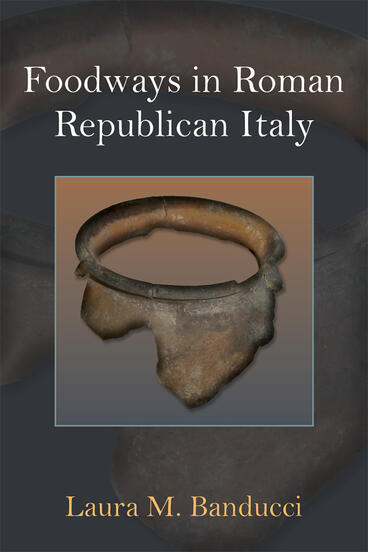Foodways in Roman Republican Italy
Uncovering Roman Republican life through food
Description
Foodways in Roman Republican Italy explores the production, preparation, and consumption of food and drink in Republican Italy to illuminate the nature of cultural change during this period. Traditionally, studies of the cultural effects of Roman contact and conquest have focused on observing changes in the public realm: that is, changing urban organization and landscape, and monumental construction. Foodways studies reach into the domestic realm: How do the daily behaviors of individuals express their personal identity, and How does this relate to changes and expressions of identity in broader society? Laura M. Banducci tracks through time the foodways of three sites in Etruria from about the third century BCE to the first century CE: Populonia, Musarna, and Cetamura del Chianti. All were established Etruscan sites that came under Roman political control over the course of the third and second centuries BCE. The book examines the morphology and use wear of ceramics used for cooking, preparing, and serving food in order to deduce cooking methods and the types of foods being prepared and consumed. Change in domestic behaviors was gradual and regionally varied, depending on local social and environmental conditions, shaping rather than responding to an explicitly “Roman” presence.
Laura M. Banducci is Associate Professor of Greek and Roman Studies at Carleton University.
Reviews
“Foodways in Roman Republican Italy presents a distinctive methodology for a more holistic analysis of ceramic data, drawing on attributes not routinely recorded or discussed in scholarship on Roman ceramics or foodways. The book justifies the need for a new approach to Roman foodways based primarily on ceramic evidence, and gives room to explore the implications of the findings in detail. This is a genuinely innovative analysis of original materials and data, sensibly conceived and producing thought-provoking results.”
—Martin Pitts, University of Exeter
“The archaeological material here is entirely traditional: pots and bones. The methods and results are both innovative and significant. While use-wear study has grown in stature in recent years, this book puts that process into action in a sustained way over multiple sites. Statistical analyses of the ceramic and faunal assemblages draw readers’ attention to patterns in the archaeological data that are then contemplated in terms of broader historical issues.”
—Mark Lawall, University of Manitoba
“Foodways in Roman Republican Italy presents a distinctive methodology for a more holistic analysis of ceramic data, drawing on attributes not routinely recorded or discussed in scholarship on Roman ceramics or foodways. The book justifies the need for a new approach to Roman foodways based primarily on ceramic evidence, and gives room to explore the implications of the findings in detail. This is a genuinely innovative analysis of original materials and data, sensibly conceived and producing thought-provoking results.”
- Martin Pitts, University of Exeter
—Martin Pitts, University of Exeter
“The archaeological material here is entirely traditional: pots and bones. The methods and results are both innovative and significant. While use-wear study has grown in stature in recent years, this book puts that process into action in a sustained way over multiple sites. Statistical analyses of the ceramic and faunal assemblages draw readers’ attention to patterns in the archaeological data that are then contemplated in terms of broader historical issues.”
- Mark Lawall
—Mark Lawall, University of Manitoba
"Foodways in Roman Republican Italy is not only a book of high-quality research, but also one that promotes transparency, providing a link to the raw data, facilitating accessibility and making this research reproducible for the next generation of researchers. It is a valuable and insightful contribution to Roman studies that showcases how mundane meals can become powerful tools in understanding past human choices and cultural identities."
- Alexandra Livarda
—Antiquity
"Banducci has given us much to think about, much to copy and emulate, and much to straightforwardly enjoy: the impressive handling (literally!) of the ceramic wares is a pleasure to engage with, as is the level of innovation in approach. In all this, Banducci shows her own disciplinary anxiety vis-à-vis the supposed tedious nature of the data as misplaced (99; passim): it is in the display of the specialist’s extraordinary skill and knowledge that we can all rejoice, to depart from the juicy table dished up for us by Banducci with an academically full belly and multiply stimulated scholarly taste buds."
- Bryn Mawr Classical Review
—Bryn Mawr Classical Review
"The book is original, innovative, and modern in its method-ology and presentation, and the findings will certainly act as food for thought for those interested in Roman diet, republican Italy, and historical cooking practices more generally."
- Erica Rowan, Royal Holloway, University of London
—American Journal of Archaeology

